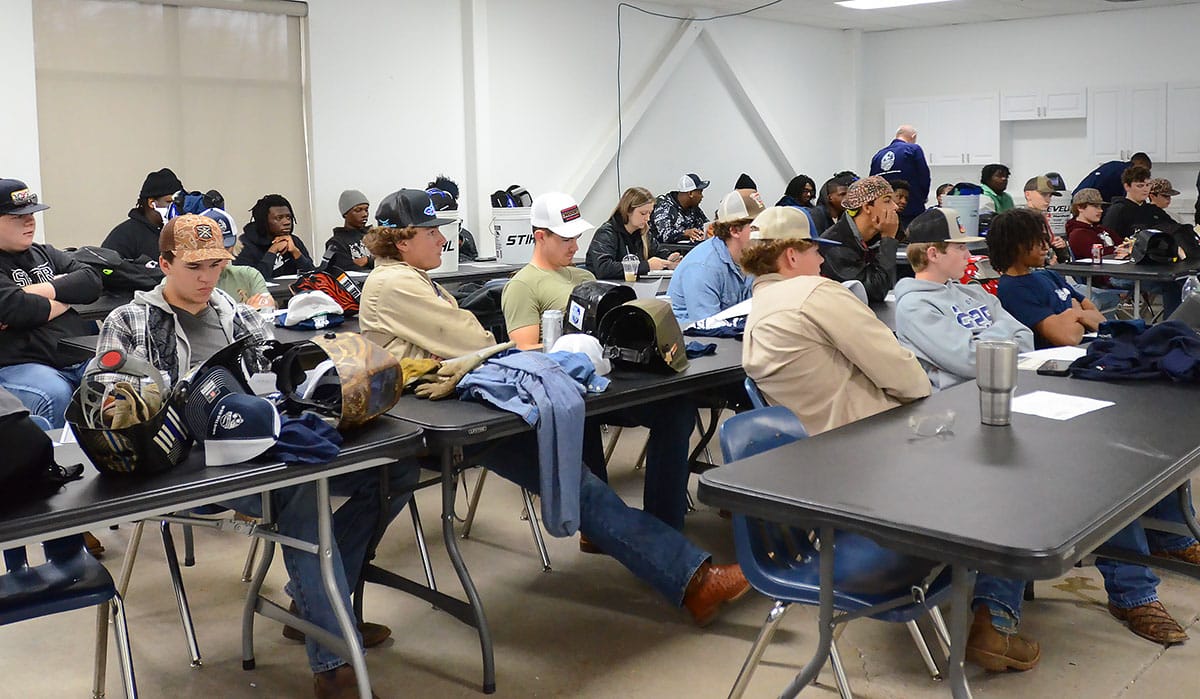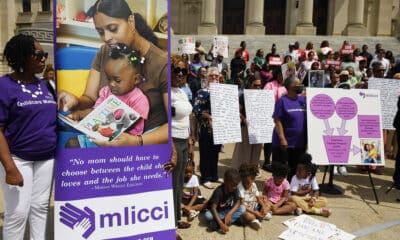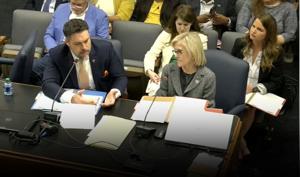Mississippi Today
High school welders compete for scholarship prizes

Students from across the state competed in the 2024 High School Welding Competition held at Delta Technical College in Ridgeland. Every competition participant will receive a $500 Delta Tech scholarship plus an opportunity to enroll in one of the college’s welding programs.
“All of you are being offered an opportunity to have a career, not a job,” the students were told during orientation. “You have a job doing fast food. This can be a career for where you make over $100,000 a year.”
The winner of the competition will receive a $5,000 scholarship to Delta Technical College. One thousand dollars will be donated to his or her high school welding department. Second and third prize winners will receive DTC scholarships towards welding training at the college.
This article first appeared on Mississippi Today and is republished here under a Creative Commons license.![]()
Did you miss our previous article…
https://www.biloxinewsevents.com/?p=336355
Mississippi Today
Federal funding loss puts help for domestic violence, crime victims at risk
Mississippi nonprofit centers that serve survivors of domestic violence, dating violence and sexual assault have been unable to apply for crucial federal grants, creating uncertainty and potentially jeopardizing services and staffing.
The U.S. Department of Justice awards tens of millions of dollars yearly through the Violence Against Women Act, but in February, grant information was taken down from the Office on Violence Against Women’s website right before the usual application deadline.
As of the end of April, the information hasn’t returned, and the office’s website announcing funding opportunities was last updated Feb. 6, telling applicants not to finalize any applications.
“So many times when you’re utilizing federal funds to pretty much run your organization, when those federal funds are cut, you have to start looking at cutting staff and services,” said Joy Jones, executive director of the Mississippi Coalition Against Domestic Violence, which receives VAWA funding.
“That is detrimental to victims of crime,” she added.
Since 2017, the U.S. Department of Justice has awarded nearly $50 million to Mississippi nonprofit centers, the State Department of Health and the Mississippi Band of Choctaw Indians. That’s money that has supported the operation of shelters, transitional housing, victim advocacy, education and more.
Other funding through VAWA includes training for law enforcement officers and prosecutors as well as support for rural communities and college campuses.
!function(){“use strict”;window.addEventListener(“message”,(function(a){if(void 0!==a.data[“datawrapper-height”]){var e=document.querySelectorAll(“iframe”);for(var t in a.data[“datawrapper-height”])for(var r,i=0;r=e[i];i++)if(r.contentWindow===a.source){var d=a.data[“datawrapper-height”][t]+”px”;r.style.height=d}}}))}();
Meridian’s Care Lodge serves nine counties in the east central part of the state. Its executive director, Kim Neal, said federal grants support the organization’s emergency shelter, where over 200 women, men and children turned to last year.
She said a lot of the funding is to ensure people have basic needs like clothing, food and a safe environment, in addition to advocacy, like when survivors want to file charges or to seek a protective order.
Tupelo-based S.A.F.E., Inc. serves nine counties in northeast Mississippi. A rural grant has allowed the organization to do work at its domestic violence shelter and in the community, including throughout April – Sexual Assault Awareness Month.
Through federal and state grants, S.A.F.E, housed 55 people last year, including those who are homeless as a result of domestic violence and sexual assault, said Zowee Shanks, S.A.F.E’s executive director.
“When people are making these decisions to pull the grants out, they are not understanding these shelters do more work than at our 19-bed facility,” she said.
Another federal funding source for domestic violence and rape crisis centers is through the Victims of Crime Act. That act created the Crime Victims Fund, which collects fines and penalties from people convicted of federal crimes and distributes the money to states.
In October, the start of the federal government’s fiscal year, the crime fund is expected to be cut by $700 million, meaning less funding for states and victim service programs.
The Mississippi Department of Health uses VAWA and VOCA grants along with $12 million from the State Legislature to support victim services that many shelters provide, said Gregory Flynn, a spokesperson for the department.
Currently, the Health Department funds support ten of the 11 domestic violence shelters across the state, including Care Lodge and S.A.F.E, Inc.
At the same time as VAWA grants were frozen, the Justice Department cancelled funding for 365 grant programs for nonprofit organizations across the country working with crime victims. Some of the grant recipients were notified that their projects no longer “effectuate” the DOJ’s agencies, CBS News reported.
“It certainly concerns us,” Neal said about the wait for answers about the federal grants.
“Domestic violence doesn’t stop even though they may freeze the funding.”
This article first appeared on Mississippi Today and is republished here under a Creative Commons Attribution-NoDerivatives 4.0 International License.![]()
The post Federal funding loss puts help for domestic violence, crime victims at risk appeared first on mississippitoday.org
Note: The following A.I. based commentary is not part of the original article, reproduced above, but is offered in the hopes that it will promote greater media literacy and critical thinking, by making any potential bias more visible to the reader –Staff Editor.
Political Bias Rating: Center-Left
This article discusses the impact of federal funding cuts on domestic violence and crime victim services, with a particular focus on how such cuts could harm vulnerable populations. The tone is critical of the funding freeze and the delay in grant processing, reflecting concern about the potential harm to victims of crime. The sources quoted, including nonprofit leaders, emphasize the importance of these federal funds for maintaining essential services. The language used is empathetic toward those affected and suggests that halting funding without alternative support could lead to significant negative consequences, particularly for marginalized communities. The piece does not explicitly advocate for any political party but highlights the consequences of budgetary decisions that disproportionately affect vulnerable groups, which is a viewpoint often associated with Center-Left political leanings.
Mississippi Today
Thousands affected by state’s hold on child care aid
Jackson mom Sequaya Coleman was applying for the first time for a voucher to help pay child care for her 2-year-old son when she heard the news.
She maynot be getting any help from the state’s Child Care Assistance Program — at least not for the foreseeable future. The Mississippi Department of Human Services has put a cost-cutting hold on which families could apply.
Without it, Coleman, who works as a housekeeper, continues to rely on her relatives and friends to watch her kids, a 2-year-old and a 12-year-old, instead. She doesn’t know if she’s been rejected, but she is in a grey area. She applied in March, the month before the hold took place.
Beginning April 1, MDHS began limiting who could apply for new applications, redetermination applications, and “add a child” applications for child care certificates.
Families who do not fit one of six priority categories (on or getting off Temporary Assistance for Needy Families, are homeless, have foster children, are teen parents, are deployed military or families with special needs) cannot apply for new certificates or have their certificates renewed. There were 36,186 children with child care certificates in late March, a week before the hold began. About 10,800 did not fit any of the six priority categories.
Coleman is concerned that the lack of child care puts an extra strain on relatives and older children, creates a greater safety risk for young children, and makes it harder for communities to thrive.
““Our kids need the help, we need the help, because if you take the help from the American people, how do you expect us to thrive as Americans? How do you expect us to thrive as a state?” she said.
MDHS is trying to reduce the number of children receiving certificates to fewer than 27,000 to fit what the department can afford since COVID-19 relief funding dried up, with a target program cost of less than $12 million a month, said Mark Jones, chief communications officer for MDHS.
“We cannot accurately estimate how long the hold will remain in place, but we will be monitoring the situation very closely and will lift the hold as soon as we can,” he said.
MDHS will notify parents 60 days before their annual redetermination deadline. Parents who want to be notified can enter their email address in the application portal.
The Child Care Payment Program provides assistance to working parents and guardians for child care. The parent or guardian still has to pay the difference between what the program provides and the actual cost of tuition. They may also have to make a co-payment every month.
According to Jones, Mississippi has dedicated approximately $379.9 million from various COVID-19 relief funding programs to child care since 2020. Mississippi currently spends 85% of its funds from the Child Care Development Fund on child care certificates, which was about $127 million in fiscal year 2024 and more than the federal minimum they’re required to spend.
Mississippi also transfers 30% of its annual state funds from the Temporary Assistance For Needy Families program to child care. In 2024, that amounted to $25.9 million.

Carol Burnett, executive director of the Mississippi Low Income Child Care Initiative, explained the financial impact for families: “The CCPP can reduce the cost of child care by as much as 80%. And so if a family is gonna have to pick up what the CCPP has offered, it’s gonna really increase the cost of child care for that family.”
MLICCI’s Employment Equity for Single Moms program helps single mothers in Mississippi access resources for child care and workforce development to help single moms find higher-paying work.
A key part of the program is helping these mothers get on the Child Care Payment Program. MLICCI usually covers child care costs for its mothers while they wait to get assistance. Without the assistance, MLICCI can’t afford to pay for long-term child care.
“The biggest chunk of families on CCPP are low-income, single-mom-headed families who are working in jobs with low wages, and they’re not one of the six priorities,” said Burnett.
In addition to the financial impact on families, the hold on applications would disrupt education for children during a crucial period. Research has shown that children who attend quality early childhood education have better academic performance in elementary school.
“Without the CCPP vouchers, many families will not be able to afford child care, and so it’s likely that families’ child care arrangements will become unpredictable and piecemeal…and this uncertainty can cause children stress, which can hinder their development and growth,” explained Biz Harris, executive director of Mississippi Early Learning Alliance.
Deloris Suel, who owns Prep Company Tutorial Schools in Jackson with her husband,said she thinks parents would be able to teach their children at home with the right training, but it would be a strain on top of their other responsibilities.
“Child care today is not a babysitting service. There’s benchmarks and goals that we have to meet,” she said.
Prep Company Tutorial Schools serves 260 children, 61 of whom have child care certificates. Only two of their students fit among the six exception categories MDHS listed.
Last week, a group of child care providers, parents and child care advocates held a press conference on the south steps of the Capitol, urging MDHS to lift the limits on new applications and redeterminations, communicate better with providers and families, and use the current and carry-over TANF funds to supplement the child care voucher program.
At the end of 2023, MDHS had over $156 million in unspent TANF funds, as other states do. Nationwide, states had unobligated TANF balances of nearly $8 billion in 2023. Spending this money on child care would be doable without legislative action, MLICCI said, and has already been done in other states.
Burnett said she does not know why the state hasn’t used this method of funding. “I mean you would think that they would want to do that when they have the money rather than create this harm for so many families,” she said.
When asked why she thinks MDHS has been hesitant to use the available TANF funds, she said “I have two words: ‘Republican state.’ Because if we have other states joining hands to say, ‘Hey, we can pull this down from here.’ Why can’t Mississippi?”
When asked about using unspent TANF funds in this way, Jones responded, “MDHS is committed to following official federal guidance regarding conversion of TANF funds to CCPP. MDHS is resolved to utilize all available recurring revenue streams to support the CCPP and ensure the long-term viability of the program.”
Jones would not comment on why the department will not use left-over TANF funds.
Jones also stated, “MDHS has discussed the potential for a pause in CCPP certificates with the child care industry each month during the information sessions. The members of SECAC (State Early Childhood Advisory Council) were well aware of this potential pause as far back as 2023.”
Families can call the Child Care Payment Program call center at 800-877-7882 for questions or reach out to their nearest Resource & Referral Center for help.
Anna Wolf contributed to this report.
Update 4/29/24: This story has been updated to clarify that the Department of Human Services has not responded to Sequaya Coleman’s application.
This article first appeared on Mississippi Today and is republished here under a Creative Commons Attribution-NoDerivatives 4.0 International License.![]()
The post Thousands affected by state’s hold on child care aid appeared first on mississippitoday.org
Note: The following A.I. based commentary is not part of the original article, reproduced above, but is offered in the hopes that it will promote greater media literacy and critical thinking, by making any potential bias more visible to the reader –Staff Editor.
Political Bias Rating: Center-Left
This article highlights the financial challenges of Mississippi’s Child Care Assistance Program and critiques the state’s decision to limit access to child care aid. It emphasizes the negative impact on low-income families, particularly single mothers, and includes quotes from advocates and experts expressing concern about the state’s policies. The tone is sympathetic towards families affected by the cuts and advocates for the use of unspent TANF funds to support the program. While the article presents various perspectives, including the state’s justification for cost-cutting, it focuses on the consequences for vulnerable populations, reflecting a center-left viewpoint in its advocacy for increased government support for child care services.
Mississippi Today
On this day in 1945, Richard Wright’s memoir was top-selling book in U.S.
April 29, 1945

“Black Boy,” Richard Wright’s memoir about his upbringing in Roxie, Mississippi, became the top-selling book in the U.S.
Wright described Roxie as “swarming with rats, cats, dogs, fortune tellers, cripples, blind men, whores, salesmen, rent collectors, and children.”
In his home, he looked to his mother: “My mother’s suffering grew into a symbol in my mind, gathering to itself all the poverty, the ignorance, the helplessness; the painful, baffling, hunger-ridden days and hours; the restless moving, the futile seeking, the uncertainty, the fear, the dread; the meaningless pain and the endless suffering. Her life set the emotional tone of my life.”
When he was alone, he wrote, “I would hurl words into this darkness and wait for an echo, and if an echo sounded, no matter how faintly, I would send other words to tell, to march, to fight, to create a sense of the hunger for life that gnaws in us all.”
Reading became his refuge.
“Whenever my environment had failed to support or nourish me, I had clutched at books,” he wrote. “Reading was like a drug, a dope. The novels created moods in which I lived for days.”
In the end, he discovered that “if you possess enough courage to speak out what you are, you will find you are not alone.” He was the first Black author to see his work sold through the Book-of-a-Month Club.
Wright’s novel, “Native Son,” told the story of Bigger Thomas, a 20-year-old Black man whose bleak life leads him to kill. Through the book, Wright sought to expose the racism he saw: “I was guided by but one criterion: to tell the truth as I saw it and felt it. I swore to myself that if I ever wrote another book, no one would weep over it; that it would be so hard and deep that they would have to face it without the consolation of tears.”
The novel, which sold more than 250,000 copies in its first three weeks, was turned into a play on Broadway, directed by Orson Welles. He became friends with other writers, including Ralph Ellison in Harlem and Jean-Paul Sartre and Albert Camus in Paris. His works played a role in changing white Americans’ views on race.
This article first appeared on Mississippi Today and is republished here under a Creative Commons Attribution-NoDerivatives 4.0 International License.![]()
The post On this day in 1945, Richard Wright's memoir was top-selling book in U.S. appeared first on mississippitoday.org
Note: The following A.I. based commentary is not part of the original article, reproduced above, but is offered in the hopes that it will promote greater media literacy and critical thinking, by making any potential bias more visible to the reader –Staff Editor.
Political Bias Rating: Centrist
This article focuses on the historical context of Richard Wright’s memoir, “Black Boy,” and its impact on American literature and race relations. It presents facts about Wright’s life and work without taking an overt political stance. The tone is primarily reflective and factual, detailing Wright’s literary achievements and his contributions to addressing racial issues in America. The language is neutral and descriptive, with no evident bias toward either side of the political spectrum. It does not push a specific ideological agenda but instead highlights historical and literary significance.
-

 News from the South - Missouri News Feed3 days ago
News from the South - Missouri News Feed3 days agoMissouri lawmakers on the cusp of legalizing housing discrimination
-

 Mississippi Today2 days ago
Mississippi Today2 days agoDerrick Simmons: Monday’s Confederate Memorial Day recognition is awful for Mississippians
-

 Mississippi Today5 days ago
Mississippi Today5 days agoStruggling water, sewer systems impose ‘astronomic’ rate hikes
-

 News from the South - West Virginia News Feed5 days ago
News from the South - West Virginia News Feed5 days agoIs West Virginia — and the rest of the country — prepared to care for our seniors?
-

 Mississippi Today5 days ago
Mississippi Today5 days agoParents, providers urge use of unspent TANF for child care
-

 News from the South - Louisiana News Feed5 days ago
News from the South - Louisiana News Feed5 days agoTaxes on vapes and smokeless tobacco advance through committee | Louisiana
-

 News from the South - Texas News Feed6 days ago
News from the South - Texas News Feed6 days agoStorms Move Through Houston: Expect Heavy Rain and Possible Flooding This Afternoon
-

 News from the South - Arkansas News Feed7 days ago
News from the South - Arkansas News Feed7 days agoOp-Ed: Another dismal year for ranked-choice voting | Opinion
























































